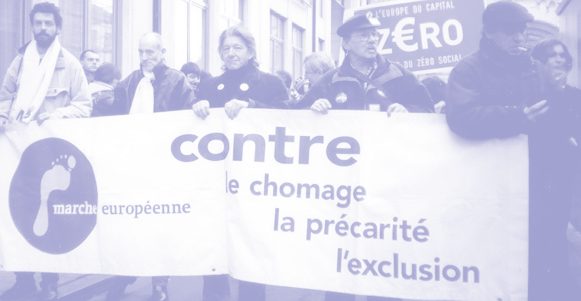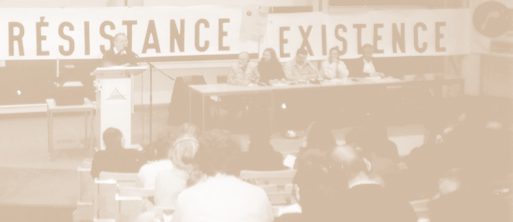

 |
 |
 |
 |
 | ||
European Marches
|
||||||||||||||
| ||||||||||||||
How is the European Employment seen in each country? |
||||||||||||||
|
This report of numerous different speeches on the topic tries to summarize the essential issues without losing the diversity. Jean-Guy Dufour NetherlandsThe European policy which, aims at reducing social security expenses, making work as cheap and flexible as possible, forcing people to accept a low paid job to live, is implemented by the Dutch government as follow:
Following these trends, the Leijnse parliamentary commission propose the so called « capucino model » which aims at reorganizing the current social protection system on the whole with three levels of social incomes: a very low income guaranteed by the State for every citizen, an insurance based on wages and an insurance based on individual savings. BelgiumThe European employment policies are implemented as follow:
GermanyIn Germany, the red-green coalition devotes itself to a general social destruction in the frame of the Agenda 2010, without any resistance from other parliamentarians. The social welfare state, guaranteed by the Constitution is being reappraised and so is the social order set up after the war. The Agenda 2010 plans the dismantling (privatisation) of protection measures in the case of illness, old age or redundancies as well as the abolishment of long term unemployed status. The four « Hartz' laws » orchestrate this leaning. In the labour market, short terms contracts have noticeably increased, their basic salary is based 20- 30% under tariff standards, redundancies are facilitated, unemployment benefits are lowered, one has to accept whatever job is proposed, regardless of qualification level and former salary. Unemployment benefit in the case of long term unemployment is abolished. Since social and political elites refuse every employment policy that could be really creative of jobs, it has become possible for an unemployed person to live without job nor benefits. This is a return to poverty:
It is odd to think that the Bertelsman Foundation (government think tank) thinks that this is still too much, that this new unemployment benefit should be halved ! The reasoning invoked by the Hartz law is clear and needs no comment: « we are right to have this demand towards the unemployed, and this demand has no limit , for the costs they are for society must absolutely be reduced ». These measures will lead to the development of very low wages sectors in the field of health, domestic help, etc. which will hit women more particularly. A great many people will be encouraged to work in temporary jobs, or they will be urged to become « free workers ». Hundred of thousands of people will be purely and simply thrown into misery. SpainThere has been in Spain for about ten years a big decline in unemployment, unemployment fell from 20% to 11% (but it is still high,16% for women). Although this is still the highest rate in the former Europe. In five years, GDP has increased by 40%, but the income per capita only increased by 31%. Most of all, the economic growth which resulted was very unequal and left a lot of people excluded : 8 million people,( more than the one fifth of the population) live under the poverty limit,on 280 € a month. Almost a half of Spanish workers are out of work or have precarious jobs, the rate of precarious jobs has kept constant at about 30% these last ten years or about four million workers. As for part-time jobs, 80% are women. The Illegal economy has developed. More and more people, above all young people, women and immigrants continually go from unemployment periods to precarious jobs, keeping them in insecurity and poverty. A lot of women have to work in such sectors as domestic cleaning work or domestic help in which employment legislation is quasi non-existent. The Spanish social protection system, as a heritage of Francoism, is low. Nowadays, a minimum income of 300 € (56% of the minimum wage) is given to only 200 000 persons. 50% of the unemployed are deprived of any kind of social benefit, and those have been reduced these last years. Fortunately, a dramatic degradation of the situation of the unemployed and rules decided by the Aznar government in 2001 concerning dismissals could be avoided thanks to two general strikes and huge demonstrations in 2001 – 2002. An enlightening precedent for all! FranceWith the aim to give of giving weight to wages, there is a collusion between employers and the government to reduce rights and unemployment benefits and to bring them under conditions. This fits into the scheme of a general aggression against all the social rights. For two years, three attacks with regard to unemployment benefits have been implemented:
The retroactive application of these last reductions to the unemployed, registered before the end of 2002, in violation of the PARE contract (an employment action plan), which was though inequitable, put an early end to the rights of 250 000 unemployed at the beginning of 2004, 660 000 will follow. Among them, a lot of executives reacted strongly and took the UNEDIC to court, these actions were backed by unemployed organisations on a large scale. (During the drafting of this work, we learnt that the unemployed have won justice in their cases). Dans le but de peser sur les salaires, il y a collusion entre le patronat et le gouvernement pour réduire les droits et les allocations des chômeurs et pour mettre celles-ci sous conditions. Ceci s’inscrit dans une agression générale contre tous les droits sociaux. GreeceSince the development of neo-liberal policies, a frontal attack against social rights which are already very weak is being carried out. The economic growth in Greece has been one of the strongest in UE these last years, but not everybody takes advantage of it. Employers profits are on average twice as much as the EU's average but 25% of the population live under the poverty limit, which is also twice as high as the EU 's average. More than 15% of workers are immigrant and have no rights at all, which is a misfortune for them and also for all Greek workers, because they are used by employers to make put pressure on wage levels. Equal rights between Greek workers and immigrants is therefore all the more necessary. More than 70% of the jobs that have been created for the past five years in Greece, are flexible jobs. Moreover, more than 35% of the work is illegal! A very strong minority of workers are actually forced to work 45, 60, even 65 hours a week in two, not to say three jobs to survive. The government recently swung over to the right. During the election campaign, the President of the socialist party proposed to introduce work without social security for at least five years for the young seeking a first job. Everybody pointed out that in that case, employers would make current workers redundant to replace them by young workers. Then, is everything so dark? Not if we keep in mind the victory following the huge mobilisation of the Greek people, three years ago, against the social security project of reforms! IrelandIn Ireland, unemployed organisations are included in the discussion process with employers and trade unions. This is a good point you should try to achieve in other countries. This is a good way to make things progress, for instance, the government just decided that from 2007, 30% of ? would help the growth of businesses, and subsequently 40% should be dedicated to the growth of unemployed benefit, which would make these benefits increase from 134 € a week to 144 € a week. On the other hand, the government raised the working time necessary to obtain rights to get benefits from 49 to 52 weeks. Furthermore, it is stated that the unemployed will have to prove they looking for a job. This is felt to be a humiliation and we are trying to reduce the possible impacts of such a policy. In addition, economic growth in Ireland is strong, though, the number of peaple living under the poverty limit increased from 15% to 22%. We have to work on a better share of economic growth. The minimum wage in Ireland is 7 €, that's the highest in Europe. That is good, but employers say that such a high level of minimum wage reduces jobs possibilities. We as unemployed organisations must fight to have good levels of wages without any loss of jobs or decrease in the level of unemployment benefit. We consider that a good balance between wages and unemployment benefit is important. Les organisations de chômeurs sont associées aux discussions entre le patronat le gouvernement et les syndicats. Ceci est une bonne chose que l’on devrait essayer d’obtenir partout en Europe. Cela permet des avancées. Ainsi, le gouvernement vientil de décider qu’à partir de 2007, 30% de la croissance des profits des entreprises et 40% ultérieurement devraient être consacrés à l’augmentation des allocations chômage, permettant de faire passer celles ci de 134 euros par semaine en moyenne actuellement à 144 euros. Par contre, le gouvernement a augmenté de 49 à 52 semaines le temps de travail nécessaire pour avoir droit aux allocations chômage et il a prévu qu’il faudrait que les chô- meurs démontrent qu’ils recherchent effectivement du travail pour y avoir droit. Ce qui est ressenti comme une humiliation et nous tentons d’amoindrir les impacts possibles de cette mesure. FinlandAt the end of the 80’s the unemployment rate in Finland was very low, below 3% of the labour force. The globalisation of the financial markets in combination with the rise in the loans rents in Germany led as in many other western European countries to a breakdown in the economic activity with bankruptcies followed by a fast rise in unemployment. The unemployment rate was at its peak in April 1994 with 16.6 %, the second highest in EU at that time. Since then the unemployment has declined very slowly. The visible unemployment, persons registered at the employment office without job and ready for work, was in January 2004 at 9.5% with an additional 1 % of the labour force in employment policy programmes. During the years of high unemployment, the neo-liberalistic recipe to fight unemployment has gained ground in the discourse. Although the most severe suggestions to cut income-taxes, social benefits, the right to unemployment benefits and to let the income disparity grow and to introduce a low income labour market have been rejected, the direction is clear – the rights of the unemployed have in many ways suffered. The unemployment benefit system was introduced in 1985 and two years later young unemployed and long term unemployed got a subjective right to get a state subsidised job for at least six months, which qualified them for a new 500 day period of unemployment benefit. In 1992-93 this system was destroyed. This resulted in a huge growth in long term unemployment, increasing income disparities and growing dependency on income support and in reality created a second level labour market for persons entering working life via employment schemes. A European social policy?Social policy is officially under the exclusive control of each member state, except in the fields of health and safety at work. It is just a consultation between member states on their social policy which can be developed on a European scale. Actually, having a look at the situation in each country shows the evidence that this consultation, when based on consensus, leads to the application of the same political trends in every country. Now, the fundamental line of this policy, specifically since the 1997 Luxemboug and 2000 Lisbon summits is to implement social measures with the aim to improve European economic competitivity with the to United-States and Japan. Social issues are only seen from this point of view. In this background, member states exclusive control means that the social rights deterioration implemented in each country does not come up against any minimum standard established on a European scale. The draft Constitution enables governments thus to carry on indefinitely that trend, denying the establishment of any minimum standard. Here is the debate: Do we have to take note of this situation and struggle for social rights in each country? Must we struggle for closer cooperation between states who would be ready to guarantee progressive social standards, as foreseen in the draft treaty, in other fields? Must we increase pressure to obtain at last, satisfying social standards on a European scale that would be compulsary in every state in the case that they are higher than national legislation? Consensus has been reached on two points though:
|
||||||||||||||
|

02/08/04
|
||||||||||||||